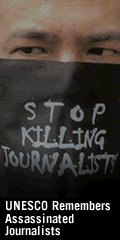The role of UNESCO in WPFD
 World Press Freedom Day 2006
World Press Freedom Day 2006Media, Development and Poverty Eradication
UNESCO promotes freedom of expression and freedom of the press as a basic human right.
UNESCO, in keeping with its Constitution, advocates the basic human right of freedom of expression, enshrined in the Universal Declaration of Human Rights, and its corollary, press freedom. Indeed, since its creation in 1945, UNESCO has been called upon to “promote the free flow of ideas by word and image”, and the Organization’s Member States have repeatedly confirmed this mandate over the years in decisions adopted by the General Conference, the highest authority of the United Nations agency. UNESCO promotes freedom of expression and freedom of the press as a basic human right.
Public’s right of access to information
A free press is not a luxury that can wait for better times; rather, it is part of the very process which can bring about better times. Freedom of the press should not be viewed solely as the freedom of journalists to report and comment. It is strongly correlated with the public’s right of access to knowledge and information. Communication often acts as a catalyst for the development of civil society and the full exercise of free expression enables all parts of society to exchange views and find solutions to social, economic and political problems. Free media play a crucial role in building consensus and sharing information, both essential to democratic decision-making and to social development.
In keeping with this mandate UNESCO has been working with professional organizations, and a wide range of governmental, as well as non-governmental partners, on several fronts to build up, support and defend free, independent and pluralistic media in developing countries, countries in transition and in conflict and post conflict areas.
UNESCO’s media work
UNESCO maintains close relations with regional and international media organizations and press freedom advocacy groups. One of its major partners is the electronic clearing-house and alert network, IFEX, which groups 500 member organizations in 130 countries. Since 1992, IFEX has facilitated the sharing of information about press freedom and the efficiency of reactions to cases of violations.
Professional training for journalists
UNESCO recognizes that media independence and freedom of information do not hinge only on the capacity of private individuals to operate media outlets; it also requires a commitment to professional standards of reporting. Thus UNESCO’s work includes advocacy, professional training for journalists and media professionals, and support for professional networks, as well as providing governments with advice and information on best practices regarding media legislation and regulation.
World Press Freedom Day
Amidst the growing recognition of the importance of press freedom for democracy and development, in 1993 the United Nations General Assembly proclaimed that May 3 is “World Press Freedom Day”. Throughout the world, this Day serves as an occasion to celebrate press freedom, raise awareness of violations against the right to freedom of expression and draw attention to the work of all too many journalists forced to brave death or jail to bring people their daily news. It is also on World Press Freedom Day that UNESCO awards the annual UNESCO/Guillermo Cano World Press Freedom Prize to a journalist who has distinguished him or herself in the fight for press freedom.
UNESCO is increasingly being asked to assist, together with the other United Nations system organizations, funds and programmes, in seeking solutions in conflict prevention, emergency assistance, and post-conflict peace-building. Freedom of the press, pluralism and independence of the media, and development of community newspapers and radio stations are crucial to the re-establishment of social bonds and to the reconciliation process.

<< Home